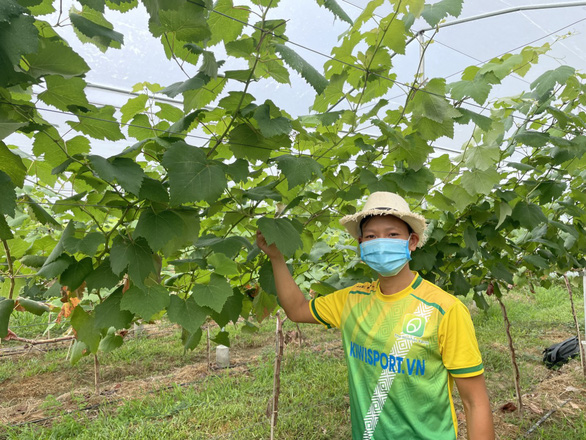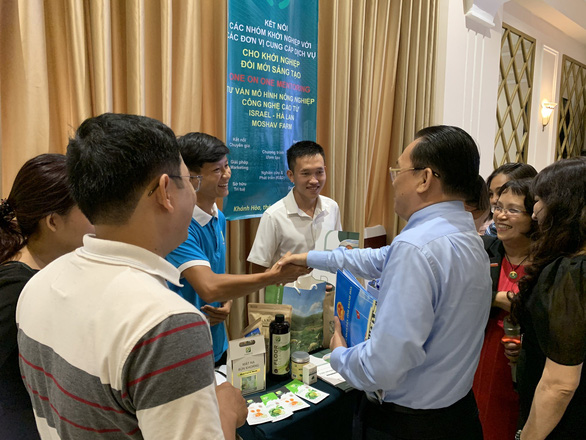Four bachelor’s degree holders in Vietnam, who share a vision to spearhead a new movement in the country’s agriculture sector, are finding success in with their replication of ‘moshav,’ a Jewish agricultural settlement model.
Once a patch of arid land, the acreage of Moshav Farm in Khanh Hoa Province is now turning a large profit thanks to the vision and work of the four founders: Nguyen Ta Dong, 32, Nguyen Manh Tien, 26, Truong Hoang Nam, 26, and Pham Minh Thong, 25.
Dong graduated from a business school, Nam studied food science, Tien majored in marketing, and Thong has a degree in finance, Dong said.
Upon his graduation, Dong was scouted by a logistics firm, who offered him a salary of VND20 million ($882) per month -- an attractive wage that stands high above the market average.
However, after a few years in the high-paying position, he realized that the job was not his true calling.
He was, instead, fascinated by the story of Israel, which turned the barren lands of the Middle East into high-yield farming acreages.
In early 2016, Dong got in touch with a group of Israeli agriculturalists who motivated him to fly to the Middle East country in a quest to learn their agriculture know-how.
Dong’s arrival in Israel inspired Tien, Nam, and Thong, who were also interested in Israel’s agriculture feats.
Following their graduation from university, the three accompanied Dong to Israel to work as apprentices on agriculture settlements.
“Our time in Israel taught us the value of hard work and persistence,” Dong recalled.
“There, we spent our whole day in stuffy glasshouses, which are scorchingly hot in the summer and extremely cold in the winter.
“We finally understood how people there achieved their success.”
Just like when they left their rural hometown for education and jobs in the city, Dong and his group knew their return to the countryside would not be risk-free.
Glamorized notions of leaving the city for an idyllic life in the countryside could create false hope since agriculture work is just as brutal as any other job.
Only those who are persistent and well-informed can yield success in the end, Dong stated.
|
|
| The Moshav Farm team introduces their products during a networking event in Vietnam. Photo: Quoc An / Tuoi Tre |
Jewish-inspired model
After completing his coursework in Israel, Dong returned to Vietnam and discovered the arid land of Suoi Mo Valley in Khanh Hoa Province, which instantly reminded him of the Middle East acreage he used to work on.
Convinced that he could use the know-how he learned in Israel to be successful in Vietnam, Dong decided to build a farm, entitled ‘Moshav,’ on the arid soil.
“‘Moshav’ is the Hebrew word for an agricultural settlement surrounded by farms,” Dong expounded.
“Farm owners and their families will live in a concentrated neighborhood with supporting utilities and services.
“They also have agriculture supply shops, schools, sports venues, social spaces, and farmer’s markets in one place.”
The initial plan for Moshav Farm covered an area of 10 hectares and was implemented by Tien, Nam, and Thong, who just returned to Vietnam from their apprenticeship.
According to Tien, building the farm on the dry land of Suoi Mo Valley was an uphill battle, as the climate, soil quality, water access, and topography all raised challenges for the group.
There were times that investments into land improvement, irrigation, and farm design almost dried their funding out, but the group calculated for these situations thanks to their experiences in Israel.
Their hard work ultimately paid off. In just a few years’ time, the sterile area was filled with flora, including mango, pomelo, jackfruit, and grape farms, as well as the accompanying vegetation cover.
The quartet was happy, but not satisfied. They brought in and fostered growing herds of cattle and poultry, including sheep, goats, deer, chickens, and ostriches, which took some of the fellow farmers aback.
“None had succeeded in growing grapes and raising sheep on this land,” Nam said.
“However, we know that people can conquer nature if we do it the right way.
“We applied the Israeli method and yielded good results with our sheep herds and grape farms.”
Starting out with 10 hectares, Moshav Farm soon expanded to 60 hectares, as the vision of its owners only grew larger.
According to Dong, their goal is not simply growing trees and raising cattle, as they also mull over how to exploit the full value of the land through collaborations.
“We have linked up with several foreign universities and experts in agriculture through the Netherlands-based nonprofit PUM in order to develop our products and bring in visitors,” Dong revealed.
The farm is also experimenting with new plant and livestock varieties, which would be transferred to other young farmers in the locale.
“As output for agricultural produce was not guaranteed before, farmers' income used to be very unstable, which prompted youth to flee to the city for better jobs, creating a disparity in the workforce between urban and rural areas,” Dong pointed out.
Addressing this problem, Moshav Farm plans to source products from these farmers to encourage them to stay and make a livelihood in their homeland.
Securing customers
Not only are they focusing on husbandry, Dong and his partners have also put a great amount of thought into their sales department.
Instead of finding distribution channels after their products are yielded, a common practice that poses high risks for the producer, Moshav Farm seeks out buyers and pitches its quality-guaranteed products even before the farm work starts.
“Vietnamese farmers tend to churn out produce en masse before they seek buyers, which puts them in a passive situation during price bargaining,” Dong stated.
“We want to change that situation by selling our products in advance.”
When they first started out, the Moshav team could only distribute products to their friends and partners.
However, they soon branched out with a dedicated marketing department, which produces video content, web posts, and Facebook updates to reach a wider base of customers.
As their work sets in motion, Moshav is currently firing on all cylinders, reporting a yearly average revenue of VND1 billion (US$44,000).
Besides 15 local workers on their payroll, the farm is also taking in 20 apprentices who share the same dream of reviving deserted farmland in their own hometowns.
Like us on Facebook or follow us on Twitter to get the latest news about Vietnam!




















































